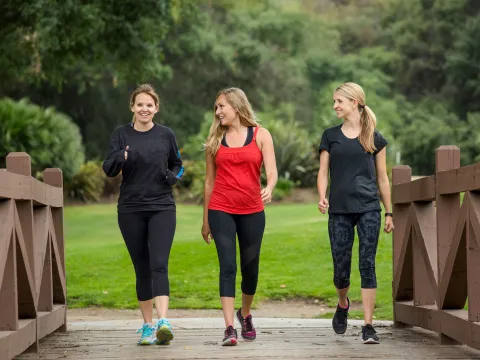- AdventHealth Foundation Central Florida

No matter the location or landscape, spending time in nature during a walk or run is good for your physical, mental and spiritual health. Getting outdoors can help strengthen your immune system, reduce blood pressure, increase energy, boost your mood and find focus. Combine all of that with the cardiovascular activity of walking, jogging, or running and the health benefits are clear.
Nature’s Immune-Boosting Impact
Nature provides the perfect environment for exercise. Green spaces contain higher concentrations of oxygen and less air pollution than urban areas, making it easier to breathe and get the oxygen levels your body needs during physical exertion.
Additionally, plants produce chemicals called phytoncides. These natural oils are a defense against pests like insects, fungi and bacteria. They also boost the human immune system, helping you respond to virus-infected cells and the cells that form tumors. And the impact is long lasing: Studies show that increased NK cell activity can last for more than 30 days after a forest trip.
Disease-Fighting Hobby
Getting up and active is an integral part of immune-boosting habits. Regular exercise can:
- Ease anxiety and depression
- Help you control your weight
- Improve your longevity and quality of life
- Keep you physically fit
- Relieve arthritis pain
- Support healthy bones, muscles, and joints
It can also substantially reduce your risk for chronic health conditions, such as anxiety, arthritis, diabetes, heart disease, high blood pressure, obesity and osteoporosis.
Anxiety
Did you know that walking releases adrenaline? This is important because when adrenaline accumulates, it can cause muscle strain and heightened anxiety. Studies have shown that walking results in immediate decreases in tension and anxiety, no matter how slow or fast you walk.
Walking also releases endorphins that can lift your spirits and keep them elevated throughout the day or night – benefiting your brain and body.
Diabetes
If you have Type I (insulin-dependent) diabetes, walking can reduce the amount of insulin you need. If you have Type II (non-insulin-dependent) diabetes, walking can reverse the disease course as part of a weight loss program that includes both diet and exercise.
Heart Disease
The Centers for Disease Control has completed 43 separate studies showing that exercise can help people significantly reduce their chances of heart problems. In fact, those who don't exercise are twice as likely to suffer from coronary heart disease.
High Blood Pressure
Almost one-third of Americans have high blood pressure, which can lead to stroke, heart attack and other serious health problems. The low-impact cardiovascular exercise you get while simply walking, can help lower your blood pressure four to ten points.
Obesity
Being active can help you lose weight and stabilize your cholesterol levels. The average person burns 100 calories for every mile walked. So if you’re walking an average rate of two and a half miles per hour, you can burn 200 to 250 calories. People who try to lose weight from dieting alone are more likely to gain it back. However, those who lose it through a combination of healthy nutrition and incorporating a low-impact activity like walking, are more likely to maintain their goal and may even continue to lose weight.
Osteoporosis and Arthritis
Walking can help increase bone density and slow the rate of calcium loss. This strengthens the bones and makes them less likely to break. The University of Washington found that women diagnosed with osteoporosis who spent one hour walking three days a week increased the bone density of their spine and other body areas by six percent over nine months.



